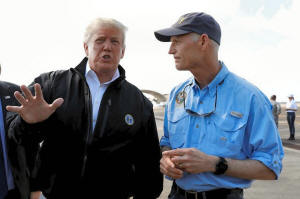|
State of Play: With congressional
election near, Republicans' talk turns Trumpian
 Send a link to a friend
Send a link to a friend
 [October 29, 2018]
By James Oliphant [October 29, 2018]
By James Oliphant
WASHINGTON (Reuters) - U.S. Senator Ted
Cruz and Wisconsin Governor Scott Walker last week learned the same
lesson many other Republicans have during this congressional election
year: One way or the other, it is hard to escape Donald Trump.
Cruz and Walker both ran against Trump for the 2016 Republican
presidential nomination, and had been campaigning for re-election
largely independent of the president. But with polls showing their races
tight ahead of the Nov. 6 elections, each walked onto a stage with Trump
last week at separate rallies in Texas and Wisconsin.
In Wisconsin, Trump told the boisterous crowd that Walker could be
“nasty” during the 2016 presidential campaign but now was a “great
friend.” Earlier in the week Trump told Texans that Cruz, who he once
derided as “Lyin’ Ted," was now “Beautiful Ted.”
When election season began, many Republican candidates tried to avoid
making the vote a referendum on the president, who remains unpopular
with a majority of Americans. Instead, they trumpeted the strong U.S.
economy and tax cuts passed by Congress last year, but those issues did
not resonate with voters.
Faced with the prospect of losing control of the U.S. House of
Representatives and a tough Senate battle, more Republicans have turned
for help to the president despite his divisive poll numbers, to insure
that his passionate supporters will turn out. The party is also adopting
his blistering rhetoric on matters such as immigration and national
security.

Trump plans to be a campaign trail fixture between now and Election Day,
with a spate of rallies planned.
Democrats must win two seats in next week’s elections to assume control
of the Senate and 23 to take the House, a more likely outcome.
Cruz remains in a close race with Democratic challenger Beto O’Rourke.
On the heels of Trump’s visit, he echoed Trump's rhetoric on 2016
Democratic presidential candidate Hillary Clinton, saying at an event
last week that O’Rourke should be locked up in a cell with Clinton. Cruz
later said he was joking.
Walker, who has been courting independent voters during his re-election
campaign, released a TV ad ahead of Trump’s arrival accusing his
Democratic opponent, Tony Evers, of favoring "special treatment for
illegals." Evers termed the ad "desperate."
Immigration is at the heart of Trump’s push to help Republican
candidates in the election’s final days.He has frequently warned that a
migrant caravan making its way to the southern border from Central
America poses a security threat.
Democratic candidates say endangered Republicans are embracing Trump now
because independent voters view last year’s tax bill as a boon for the
wealthy and are concerned about issues such as health care.
“They don’t have any kind of consistent economic message they can run
on,” said Jeb Fain, a spokesman for House Majority PAC, an advocacy
group that supports Democratic candidates.
A CULTURE WAR
Last month Democratic chances of taking both the Senate and the House
seemed brightest. Then Republicans, with Trump leading the way, seized
on the battle over the confirmation of Supreme Court Justice Brett
Kavanaugh to tag the nominee's opponents as a “liberal mob,” suggesting
that the country would plunge into anarchy if Democrats took control of
Congress.
[to top of second column]
|

President Donald Trump talks to Florida Governor Rick Scott (R) as
the president arrives to tour storm damage from Hurricane Michael at
Eglin Air Force Base, Florida, U.S., October 15, 2018. REUTERS/Kevin
Lamarque/File Photo

The message was quickly amplified by the National Republican
Congressional Committee (NRCC) and allies such as the Congressional
Leadership Fund. Both groups cut ads accusing Democrats of being
closet “radicals” and “socialists.”
The Congressional Leadership Fund, tied to outgoing House Speaker
Paul Ryan, released a wave of radio ads this month targeting
Democratic contenders in tight races in states such as Kentucky,
Minnesota and Virginia, as part of the "liberal mob.”
The Democrats included Amy McGrath, a former Marine Corps pilot, Dan
Feehan, who served as an Army officer in the Iraq War, and Abigail
Spanberger, a former CIA officer.
Republican Senate candidates such as Marsha Blackburn in Tennessee,
Mike Braun in Indiana, and Josh Hawley in Missouri last week also
warned that the caravan is a threat. Blackburn called it an “illegal
alien mob.”
Many Republicans say the strategic shift has boosted their chances
of holding the Senate, with several races breaking their way in
recent weeks.
“If Democrats take back power, their far-left mobs would hasten
dysfunction and grind our economic progress to a halt,” said Matt
Gorman, communications director for the NRCC.
A Republican source familiar with the party’s strategic thinking
said the effort was aimed at keeping Republican voters from crossing
over to Democratic candidates by appealing to their social values
while taking advantage of Trump’s affinity for waging battles over
culture.

Marc Lotter, a former top aide to Vice President Mike Pence, praised
Trump’s “ability to identify key messages and themes, set the table,
and see it play out in the electorate.”
But there is a political risk in going too far in Trump’s direction.
Last year as the election approached for Virginia governor,
Republican Ed Gillespie's campaign increasingly turned to warning
about immigrant gangs. Suburban voters were not swayed and he lost
decisively.
That is largely why a bevy of Republican House candidates from
suburb-heavy districts have tried to keep their distance from the
president during the campaign.
Even so, many of those moderate candidates could lose their seats to
Democrats next week. In the long term, this means Republican
lawmakers, whether in the majority or the minority, will be tied to
Trump more closely than ever.
(Editing by Jason Szep and David Gregorio)
[© 2018 Thomson Reuters. All rights
reserved.]
Copyright 2018 Reuters. All rights reserved. This material may not be published,
broadcast, rewritten or redistributed.
Thompson Reuters is solely responsible for this content. |